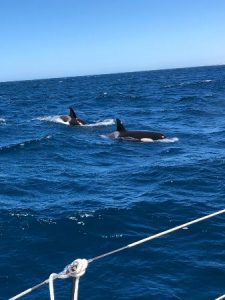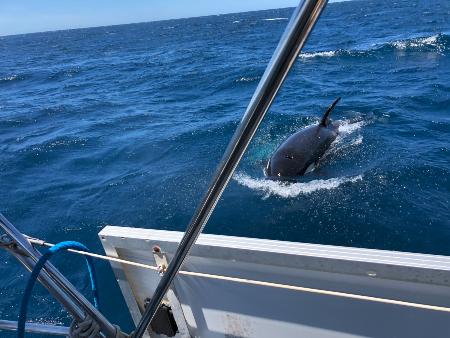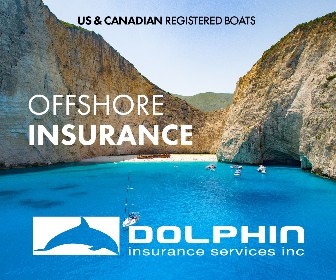Spain: Clarification on what tactics used by yachts to repel orcas are forbidden by Spanish law
As yachts begin to transit from Northern Europe down the coast of Spain and Portugal to the Mediterranean, the UK Royal Yachting Association (RYA) is advising skippers to be aware of their guidance for Orca encounters, following communications from the Spanish Government.
Published 3 years ago
Source: Royal Yachting Association


The following should be read alongside the Royal Yachting Association’s guidance and that produced by the Atlantic Orca Working Group.
The Spanish Government Ministry for the Ecological Transition and the Demographic Challenge (MITECO) has indicated to the RYA that:
“All cetaceans present in Spanish waters are protected by the Habitats Directive and by Law 42/2007, of December 13, on Natural Heritage and Biodiversity.”
Please note that the term cetaceans includes all species of whales and dolphins, including orca (otherwise known as killer whales). This includes:
“Specifically, the population of killer whales of the Strait of Gibraltar and the Gulf of Cadiz is listed as vulnerable on the Spanish Catalog of Endangered Species developed by Royal Decree 139/2011.”
This population of killer whales lives in the Gulf of Cadiz in spring and in the Strait of Gibraltar in summer, following the migration of bluefin tuna that enters the Mediterranean to spawn in spring. At the end of the summer this population of killer whales migrates towards the Cantabrian Sea (off the coast of Galicia).
The RYA note that this orca population is reliant on the bluefin tuna migration as a food source, and that the migration route coincides with that for transit passages taken by recreational craft between NW Europe/ UK and the Mediterranean. The close proximity of routes enable confrontations between orcas and crews of recreational craft. Incidents involve whales bumping, pushing and damaging craft, particularly rudders. The cause of this remains unclear.


- Orca approaching SV La Dolce Vita
MITECO indicates that, as protected species, “Law 42/2007 forbids any action carried out with the purpose of killing, capturing, persecuting, or disturbing them. Furthermore, the approach by boat to cetaceans is regulated by Royal Decree 1727/2007, of December 21, which establishes measures for the protection of cetaceans. In its article 4 this royal decree lists several actions that are considered to be able to harm, annoy or disturb cetaceans, so they are forbidden:
- a) Physical contact of boats or people with the cetacean or group of cetaceans.
- b) Feeding the animals, throwing food, drinks, rubbish or any other type of object or solid or liquid substance that is harmful to cetaceans.
- c) Prevent the free movement of cetaceans, intercept their trajectory, cut their path or cross a group of cetaceans, at any time and in any direction.
- d) Separate or disperse the group of cetaceans and, especially, stand between an adult and its offspring.
- e) Produce noises and loud or shrill sounds to try to attract them or drive them away, including the emission of sounds underwater.
- f) Bathing or diving in the Exclusion Zone [as defined in the decree] of the Mobile Space for the Protection of Cetaceans.”
How the law applies to recreational craft is described by MITECO as follows:
“It is forbidden to approach with the boat less than 60 m from the cetaceans and in the event that they approach to the boat:
- There will never be reverse gear, except in an emergency situation or to prevent a collision with another boat or with a cetacean.
- No sailing in a circle around a cetacean or group of cetaceans.
- It is forbidden to start the propeller or start the engine while the animals are less than 60 meters from the boat, and in this case it will have to be done a few minutes after they have started to move away from this area. If necessary, it should be started gently and the manoeuvre carried out smoothly and progressively, paying special attention to the propeller, as there should be no cetaceans near it.”
What of Social Media Advice?
Given the need to safeguard the liability of crews, the RYA asked MITECO to clarify the legal status of practices being mentioned in reports and recommended on social media and in publications. The Spanish Government has responded indicating that: “using an engine and propeller to reverse a boat towards an orca, the use of “noise makers”, “pingers”, Acoustic Deterrent Devices (ADD) attached to boats, and throwing of pyrotechnics, flares, etc. at approaching whales, are forbidden by Spanish law.”
Richard Hill, the RYA’s Planning and Environment Officer, told Noonsite, “Boaters are being placed in an invidious position by being given advice on actions to take, from a variety of sources, some of which could result in legal liability. My advice is to ignore social media and other outlets and use the Atlantic Orca Working Group information to minimise risk of an incident, in particular be smart about passage planning and timing. Unfortunately, crews may not have realised this in time for this summer – so our advice should be followed if they cannot avoid an encounter – this will keep them the right side of the law.
Spanish law indicates that crews at risk are restricted to passive actions (such as set out in the RYA guidance) and preventative measures for recreational craft (particularly those <15 metres in length) such as the temporary exclusion areas set up by the Spanish Government (2020 near Cape Finisterre and in 2021 in the Gulf of Cadiz).
The RYA are considering expanding their guidance to include:
- Checking insurance prior to departure
- Passage planning using information provided by Atlantic Orca Working Group
- Reinforcing rudder tubes/ fittings
- Carrying of steering spares, emergency rudder, etc.
- Knowing how to use emergency steering techniques
RYA members who need information prior to their departure south, should contact Richard Hill, Planning and Environment Officer for the RYA: richard.hill@rya.org.uk
………………………………………………………………………………………………………………………………………….
Related News:
For more Noonsite news about Orca encounters, click here.
………………………………………………………………………………………………………………………………………….
Related Links:
Related to following destinations: Portugal, Spain, United Kingdom
Related to the following Cruising Resources: Atlantic Ocean East, Environment, Mediterranean, Orcas and Yachts, Routing





A plea from the ORCA working group at https://www.orcaiberica.org/, who have not been receiving many reports of Orca interactions in 2022, to do better please!: “If we do not receive detailed information, we would not be able to update the maps. If you are aware of any interaction please respond to our questionnaire by writing to us. Maps are not being updated as often, please check also the recommendation section.”
I would point out that the tactic of reversing should not apply to the Spanish Government guideline “[…] using an engine and propeller to reverse a boat towards an orca[.]”
The idea is to continue on course while reversing so that the animals would find no rudder at the “new stern” and loose interest and NOT to target the animal whilst on reverse.
I’ve known of two incidents, told by the actual skippers and in both cases the animals lost interest and left, unharmed.
An evaluation of these habitat preservation regulations from Spain should be made against international regulations – such as IMO regulations – of a captains duty and authority to protect his/her ship against damges that potentially can be of danger to ship and people.
I would regard an orca attack on my ships rudder a danger and act accordingly regardless of certain countries politicly correct rules for their habitat protection.
Just linking these kind of information to the cruising community without a proper evaluation of its validity vs the captains right to protect his/her vessel is creating confusion.